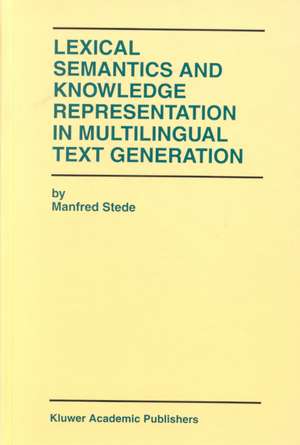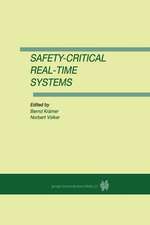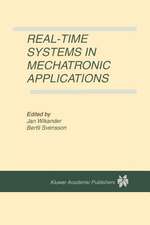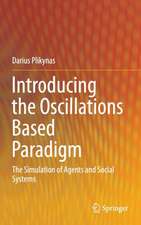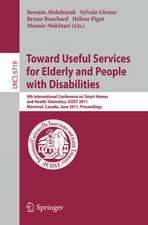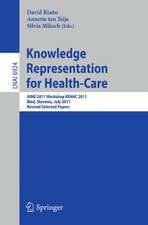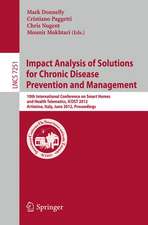Lexical Semantics and Knowledge Representation in Multilingual Text Generation: The Springer International Series in Engineering and Computer Science, cartea 492
Autor Manfred Stedeen Limba Engleză Hardback – 31 ian 1999
Lexical Semantics and Knowledge Representation in Multilingual Text Generation develops the means for systematically deriving a set of paraphrases from the same underlying representation with the emphasis on events and verb meaning. Furthermore, the same mapping mechanism is used to achieve multilingual generation: English and German output are produced in parallel, on the basis of an adequate division between language-neutral and language-specific (lexical and grammatical) knowledge.
Lexical Semantics and Knowledge Representation in Multilingual Text Generation provides detailed insights into designing the representations and organizing the generation process. Readers with a background in artificial intelligence, cognitive science, knowledge representation, linguistics, or natural language processing will find a model of language production that can be adapted to a variety of purposes.
| Toate formatele și edițiile | Preț | Express |
|---|---|---|
| Paperback (1) | 984.18 lei 6-8 săpt. | |
| Springer Us – 23 oct 2012 | 984.18 lei 6-8 săpt. | |
| Hardback (1) | 990.62 lei 6-8 săpt. | |
| Springer Us – 31 ian 1999 | 990.62 lei 6-8 săpt. |
Din seria The Springer International Series in Engineering and Computer Science
- 24%
 Preț: 1041.98 lei
Preț: 1041.98 lei - 20%
 Preț: 643.50 lei
Preț: 643.50 lei - 18%
 Preț: 1225.62 lei
Preț: 1225.62 lei - 18%
 Preț: 965.02 lei
Preț: 965.02 lei - 20%
 Preț: 646.12 lei
Preț: 646.12 lei - 18%
 Preț: 948.79 lei
Preț: 948.79 lei - 20%
 Preț: 646.62 lei
Preț: 646.62 lei - 15%
 Preț: 637.46 lei
Preț: 637.46 lei - 20%
 Preț: 643.83 lei
Preț: 643.83 lei - 18%
 Preț: 949.23 lei
Preț: 949.23 lei - 20%
 Preț: 644.48 lei
Preț: 644.48 lei - 20%
 Preț: 994.92 lei
Preț: 994.92 lei - 20%
 Preț: 645.97 lei
Preț: 645.97 lei - 18%
 Preț: 946.87 lei
Preț: 946.87 lei - 20%
 Preț: 995.57 lei
Preț: 995.57 lei - 18%
 Preț: 956.99 lei
Preț: 956.99 lei - 20%
 Preț: 644.98 lei
Preț: 644.98 lei - 15%
 Preț: 649.54 lei
Preț: 649.54 lei - 18%
 Preț: 950.21 lei
Preț: 950.21 lei - 18%
 Preț: 1221.38 lei
Preț: 1221.38 lei - 18%
 Preț: 957.62 lei
Preț: 957.62 lei - 15%
 Preț: 643.99 lei
Preț: 643.99 lei - 18%
 Preț: 948.47 lei
Preț: 948.47 lei - 18%
 Preț: 947.35 lei
Preț: 947.35 lei - 20%
 Preț: 1284.65 lei
Preț: 1284.65 lei - 20%
 Preț: 1628.31 lei
Preț: 1628.31 lei - 20%
 Preț: 1285.78 lei
Preț: 1285.78 lei
Preț: 990.62 lei
Preț vechi: 1238.28 lei
-20% Nou
Puncte Express: 1486
Preț estimativ în valută:
189.58€ • 205.85$ • 159.25£
189.58€ • 205.85$ • 159.25£
Carte tipărită la comandă
Livrare economică 22 aprilie-06 mai
Preluare comenzi: 021 569.72.76
Specificații
ISBN-13: 9780792384199
ISBN-10: 0792384199
Pagini: 219
Ilustrații: XV, 219 p.
Dimensiuni: 155 x 235 x 20 mm
Greutate: 0.52 kg
Ediția:1999
Editura: Springer Us
Colecția Springer
Seria The Springer International Series in Engineering and Computer Science
Locul publicării:New York, NY, United States
ISBN-10: 0792384199
Pagini: 219
Ilustrații: XV, 219 p.
Dimensiuni: 155 x 235 x 20 mm
Greutate: 0.52 kg
Ediția:1999
Editura: Springer Us
Colecția Springer
Seria The Springer International Series in Engineering and Computer Science
Locul publicării:New York, NY, United States
Public țintă
ResearchCuprins
1. Introduction.- 1.1 Natural language generation.- 1.2 Goals of this research.- 1.3 Overview of the book.- 2. Lexicalization in NLG.- 2.1 Introduction.- 2.2 The nature of lexical items in NLP.- 2.3 Linking concepts to lexical items.- 2.4 Criteria for lexical choice.- 2.5 Placing lexicalization in the generation process.- 2.6 Conclusions: making progress on lexicalization.- 3. Classifying Lexical Variation.- 3.1 Intra-lingual paraphrases.- 3.2 Inter-lingual divergences.- 3.3 Divergences as paraphrases.- 4. Modelling the Domain.- 4.1 Building domain models for NLG.- 4.2 Knowledge representation in LOOM.- 4.3 Ontological categories.- 4.4 The domain model.- 5. Levels of Representation: Sitspec and Semspec.- 5.1 Finding appropriate representation levels in NLG.- 5.2 Linguistic ontology: adapting the ‘Upper Model’.- 5.3 SitSpecs.- 5.4 SemSpecs.- 6. Representing the Meaning of Words.- 6.1 Introduction: Lexical semantics.- 6.2 Denotation and covering.- 6.3 Partial SemSpecs.- 6.4 Connotation.- 6.5 Salience.- 7. Verb Alternations and Extensions.- 7.1 Background: verb alternations.- 7.2 Alternations as meaning extensions.- 7.3 Lexical rules for alternations and extensions.- 7.4 Extension rules for circumstances.- 7.5 Examples: lexical entries for verbs.- 7.6 Summary.- 8. A System Architecture for Multilingual Generation.- 8.1 Lexicalization with constraints and preferences.- 8.2 The computational problem.- 8.3 Architecture and algorithm.- 8.4 Implementation: MOOSE.- 8.5 Summary: lexicalization qua subsumption.- 9. Generating Paraphrases.- 9.1 Verbalizing states.- 9.2 Verbalizing activities.- 9.3 Verbalizing events.- 9.4 Solutions to legalization problems.- 10. From Sentences to Text.- 10.1 Text representation.- 10.2 Embedding MOOSE in a text generator.- 10.3 Example:technical documentation.- 11. Summary and Conclusions.- 11.1 Summary of the work.- 11.2 Comparison to related work.- 11.3 Directions for future research.- References.
Recenzii
`I recommend the book not only to researchers interested in text generation and in machine translation, but to everybody interested in the relationship between language-independent knowledge representation and language-specific ontologies... Stede's specific proposal is well defined and effective.'
Computational Linguistics, 26:2
Computational Linguistics, 26:2
